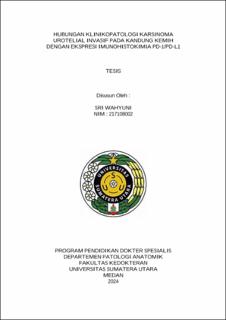Hubungan Klinikopatologi Karsinoma Urotelial Invasif pada Kandung Kemih dengan Ekspresi Imunohistokimia PD-1/PD-L1
Correlation Clinicopathological Invasive Urothelial Carcinoma of Bladder with PD-1/PD-L1 Immunohistochemistry Expression

Date
2024Author
Wahyuni, Sri
Advisor(s)
Laksmi, Lidya Imelda
Mariedina, Causa Trisna
Metadata
Show full item recordAbstract
Background: Invasive urothelial carcinoma is a malignant epithelial neoplasm arising from the urothelial lining of the urinary bladder. Urothelial carcinoma is 4 times more commonly in men than women, cause the sixth most common cancer and the ninth cause of death in men. The treatment strategy for urothelial carcinoma depends on non-muscle invasion or muscle invasion. Neo-adjuvant/adjuvant therapy is performed based on the stage of the disease and the presence or absence of metastasis. The adjuvant therapy regimens is immunotherapy programmed cell death-1 protein (PD-1) or its ligand (PD-L1), where this option is preferred for patients who are refractory to chemotherapy regimens.
Objective: To determine clinicopathological features invasive urothelial carcinoma and to analyze the correlation between clinicopathological invasive urothelial carcinoma with PD-1/PD-L1 immunohistochemistry expression.
Methods: This study is an analytical study with a cross-sectional approach, using paraffin blocks from the last 3 years that have been diagnosed as invasive urothelial carcinoma, with 32 samples. Primary PD-1/PD-L1 antibodies use GeneAbTM Monoclonal Rabbit Anti-Human PD-L1 Antibody, 1:100 dilution from the manufacturer GenomeMe which will appear positive and be assessed on the membrane and/or cytoplasm of tumor cells, lymphocytes and macrophages, positive control: tonsils. Calculations using Combine Positive Score (CPS) method.
Results: Invasive urothelial carcinoma was common found in men, age ≥ 60 years, mild TILs and the most subtype of urothelial carcinoma with squamous differentiation.
Conclusion: PD-1/PD-L1 immunohistochemistry expression showed a significant corellation with LVI and was only expressed in the urothelial carcinoma with squamous differentiation subtype.
Collections
- Master Theses [132]
